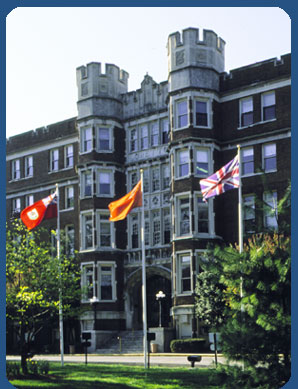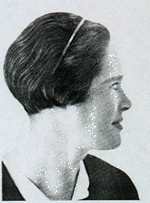| Women's Intellectual Contributions to the Study of Mind and Society Students, as part of an advanced seminar, examined and wrote about the lives of these women,
their intellectual contributions, and the unique impact and special problems that being female had
on their careers. |  |
| For information about referencing this paper - Click Here |

Camilla Hidegarde Wedgwood
1901-1955
by Jennifer McBride
Camilla Hildegarde Wedgwood was a British social anthropologist. Her best known work included her studies of women and children on the island of Manam, New Guinea, and her efforts to improve secondary education for indigenous women in Oceania.
Camilla Wedgwood was born on March 25, 1901 in Barlaston, England. She was the third of seven children born to Josiah Wedgwood and Ethel Bowen Wedgwood. Wedgwood's heritage was quite legendary. Her father was a descendant of Josiah Wedgwood I, the creator of the distinctive china bearing his name, and her father's great uncle was Charles Darwin, who often visited the family estate and greatly influenced Camilla's parents.
Ethel Wedgwood was a well-known public figure and prominent intellectual, and somewhat of a free-spirit. By the time Camilla was ten years old, Ethel Wedgwood had separated from Josiah, leaving the children to reside at Barlaston with their father. Josiah Wedgwood later became a Member of Parliament and was a renowned Labour leader, deeply committed to social and political causes.
Wedgwood attended Orme Girls' School in Staffordshire, and then proceeded to Bedford College, London, where she specialized in English. Wedgwood completed her secondary education at Newnham College at Cambridge, where she graduated with honors in English, anthropology, and archeology.
After graduating from college, Wedgwood began an extensive and varied teaching career than spanned three continents. Wedgwood returned to her alma mater, Bedford College, in 1926, where she served for one year as an assistant lecturer in the Department of Social Studies. In 1928, Wedgwood moved to Australia, and for the next year she was a temporary lecturer at the University of Sydney's Department of Anthropology. In 1930, Wedgwood relocated to South Africa, and became a temporary lecturer in the Department of African Life and Languages at the University of Cape Town. In 1931, Wedgwood returned to England, and for the next year she not only served as a research assistant to Bronislaw Malinowski, but also worked as a temporary lecturer in Anthropology at the London School of Economics.
In 1932, Wedgwood was awarded a fellowship by the Australian Research Council to conduct fieldwork in Manam Island, New Guinea. Wedgwood's proposed locale of research caused quite a stir in England. The prevailing cultural attitude at the time envisioned New Guinea and the Australian backcountry as being populated by "savages," headhunters and cannibals. This imagined environment was deemed inappropriate for an upper-class white woman. However, despite public objections, Wedgwood set sail for Manam Island in December 1934, and returned to Sydney the following May. Wedgwood's work on the island was very successful. Wedgwood's fieldwork on Manam concentrated on the lives of women and children, girls' puberty rites, and the effects of culture contact. Wedgwood conclusions about the status of women on Manam continue to inspire debate. Unlike Margaret Mead, Wedgwood thought that women in Manam held the status of "junior partners" rather than dependents. She observed the change in women's status (from one of significant economic participation to one of relative economic dependence) as a result of colonialism, mainly the introduction of a cash economy, where males play the dominant role as wage earners. During her brief stay on Manam, Wedgwood was able to gain the confidence and friendship of the island residents, although she was unable to fully master their native tongue. Wedgwood's work on Manam Island led to the planning and establishment of a secondary school for girls in Nauru.
After her return to Sydney, Wedgwood was commissioned by the government of Nauru to study native arts and crafts and to evaluate the status of native education, with the goal of determining ways of reviving native culture. This was Wedgwood's first assignment in applied anthropology, and it greatly fostered her growing interest in indigenous education issues.
Shortly after completing her fieldwork in 1935, Wedgwood was appointed to the position of Principal of the Women's College at the University of Sydney, a post she held until 1944. Wedgwood's nine year administration brought many positive changes to the University; a new wing was added to the school, the cultural life of the College was enriched and developed, and the female students were encouraged to take part in the general life of the University.
In 1944, Wedgwood volunteered for the Women's Services of the Australian Army with the rank of Lieutenant-Colonel. She was assigned to the Army Directorate of Research, which was concerned with administration problems in Papua and New Guinea. From 1944-45 and from 1946-47, Wedgwood conducted surveys on the condition of native education and on the contact situation in general in Papua and New Guinea. Wedgwood found a general indifference toward the education of females, a view that was shared by the indigenous village teachers (who were predominantly men) and even by some of the older native women. Her findings effectively influenced Australian policies regarding native education and contact problems in New Guinea.
After the war, Wedgwood joined the staff of the newly established School of Pacific Administration, where native education in particular and secondary education for women continued to be her primary interest. While at the School of Administration, Wedgwood lectured to native teachers on education and the revival of traditional culture, and promoted the need for technical and vocational training for native women.
Wedgwood returned to England briefly in 1947, where she worked at the
Institute of Education at the University of London. She returned to Australia
in 1948 and continued as senior lecturer in anthropology and native education
at the Australian School of Pacific Administration. Her prestigious position
allowed her lay the foundations of, and develop courses in, the subject of
native education on a scale not previously attempted in Australia.
At the end of 1951, UNESCO invited Wedgwood, as the expert of the South Pacific region, to attend a seminar in Paris on the use of vernacular languages in education. She served the Commission's Social Welfare section, and in 1953 part of her time was officially made available for work with the Commission, during which she wrote and presented various papers.
Camilla Hildegarde Wedgwood died on May 17, 1955 after months of intense pain due to lung cancer. Wedgwood made several lasting contributions to the discipline of anthropology, both in the academic sphere and the applied. Wedgwood was a regular contributor to "Oceania," "South Pacific," and her work appeared in the "Journal of the Royal Anthropological Institute." In her writings, Wedgwood tackled various theoretical issues such as the male bias in anthropological research. She observed and was critical of the fact that most male researchers portray women's roles in non-Western societies as secondary. Wedgwood blamed this fact on the androcentric bias of the scholars and also their Western approach to evaluating women's status. On the whole, Wedgwood's contributions to applied anthropology were one of service rather than writing. Her extensive efforts to promote and reform native education prove this. Wedgwood was remembered fondly by the Manam Islanders, with whom she spent much time and concentrated the greater part of her reform efforts.
For more information about women in the history of anthropology, see Gacs, U., Khan, A., McIntyre, J., & Weinberg, R. (Eds.). (1988). Women anthropologists.
Westport, CT: Greenwood.
Back to Women's Page

